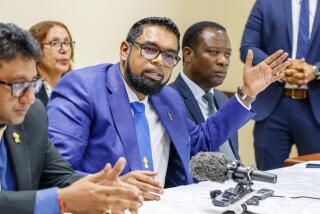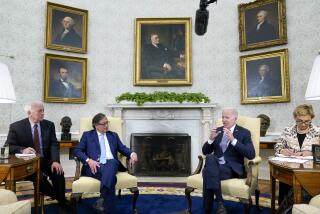Defiant Venezuelan Leader Opts to Take Road Less Traveled
- Share via
BUENOS AIRES — Venezuelan President Hugo Chavez has made it to prime time.
He climbed into a limousine at an Iranian border post Thursday, crossed into Iraq and took a helicopter to Baghdad. Within hours, Chavez became the first democratic leader to sit down with Saddam Hussein since the 1991 Persian Gulf War. The media beamed images of the milestone meeting around the world.
The populist former paratrooper met with the mustachioed Iraqi president despite a U.N. effort to isolate Hussein as punishment for his invasion of Kuwait in 1990. In fact, Chavez traveled by land to get around U.N. restrictions on non-humanitarian flights to Baghdad.
By crossing the border, Chavez crossed a symbolic line in the sand. He gleefully defied U.S. appeals to refrain from making the trip. The latest display of his affinity for tyrants, extremists and enemies of the United States complicates Washington’s delicate relationship with Venezuela, a troubled nation that is the top supplier of America’s oil.
Since Chavez’s election in December 1998, U.S. diplomats have taken a restrained approach toward the swashbuckling leader, who is prone to unleashing lengthy tirades against imperialists, oligarchs and others he perceives as enemies. Last month, he reportedly said of the upcoming trip to Iraq: “Imagine what the Pharisees will say when they see me with Saddam Hussein.”
U.S. diplomats prefer to focus on Chavez’s deeds rather than his words. But now he has backed words with action.
“We are a proud people, and I represent a sovereign state that makes its own decisions,” Chavez declared upon arriving in Iraq. “Why are the North Americans offended? We are exercising our rights. I am here to invite Saddam Hussein to the OPEC summit” next month in Caracas, the Venezuelan capital.
The U.S. response reflected frustration and ambivalence. Saying that the State Department was “deeply concerned,” spokesman Richard Boucher called the trip “inappropriate” and “hard to understand.”
“We do think it’s a rather dubious distinction to be the first democratically elected head of state to go meet with the dictator of Iraq,” Boucher said. The White House, however, later softened the tone, with a spokesman saying that U.S. officials understand that Chavez has a leadership role in the Organization of Petroleum Exporting Countries.
The context of the Hussein meeting is worrisome. Chavez, who has just won reelection, admires Cuban President Fidel Castro and has ties to far-right military extremists in Argentina. Chavez wrote an affectionate letter to the international terrorist known as “Carlos the Jackal,” a Venezuelan imprisoned in France whose real name is Ilich Ramirez Sanchez. And the Venezuelan president has angered Colombian leaders with his seeming affinity for that neighboring nation’s guerrilla forces.
In addition, Chavez pointedly rebuffed Washington by barring U.S. anti-drug flights in Venezuelan airspace. After the deadliest floods in Venezuelan history last year, diplomatic tensions rose when he sent back U.S. military ships bringing direly needed tractors and bulldozers for the recovery effort because he didn’t want U.S. soldiers accompanying the equipment.
Chavez’s whirlwind tour of member states of OPEC, an organization over which Venezuela presides this year, will also bring him to Libya. Chavez says he looks forward to talking with longtime dictator Moammar Kadafi and describes Libya as “a model of participatory democracy.”
Such talk shows that Chavez is erratic and dangerous, critics say. Carlos Alberto Montaner, a Cuban exile columnist, calls him “a tropical Kadafi.”
Venezuelans have had a friendly relationship with the United States; they love baseball and, especially in the days of oil wealth, shopping trips to Miami. Yet, many Venezuelans apparently see Chavez’s visit to Iraq as oil-related business, not an overture to an outlaw.
“I like it,” said Manuel Alcalde, a newspaper vendor in Caracas. “Saddam might not be an angel, but neither is Clinton. The objective is to talk about oil, and I don’t see why we should have to follow U.S. instructions.”
Chavez clearly wants to demonstrate independence and raise the banner of solidarity among developing nations. His strategy reflects self-confidence but entails risk, says Riordan Roett of the Johns Hopkins School of Advanced International Studies.
“If he crosses that line to support what the U.S. considers to be rogue states, he will immediately be condemned and Venezuela will be ostracized,” Roett said. “I don’t think he’s anti-American, but I do think he thumbs his nose at American dominance.”
The conversation between the two leaders concentrated on strengthening OPEC and standing up to pressure to bring down oil prices, Chavez said afterward. Hussein took Chavez on a personal tour of Baghdad, driving the car himself with his Venezuelan guest sitting beside him.
More to Read
Sign up for Essential California
The most important California stories and recommendations in your inbox every morning.
You may occasionally receive promotional content from the Los Angeles Times.













